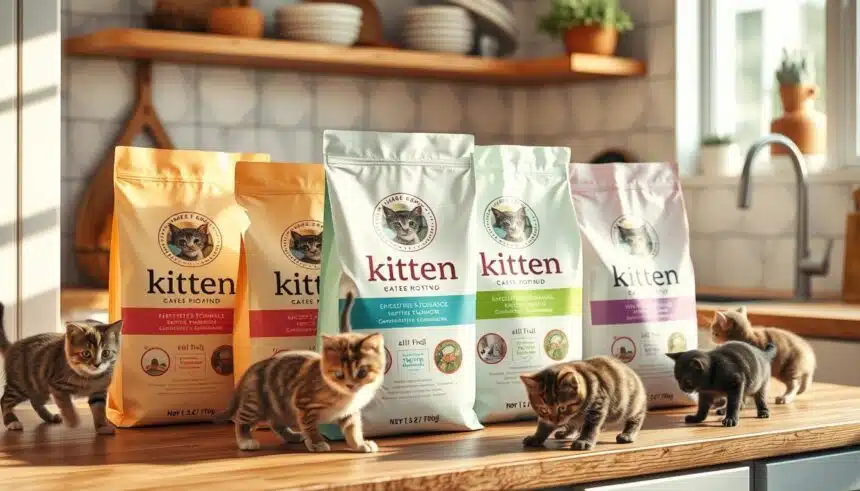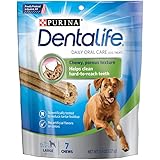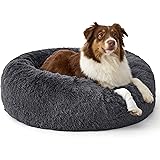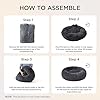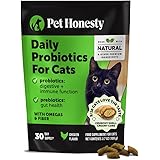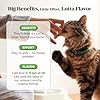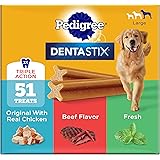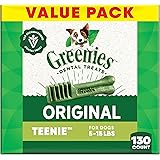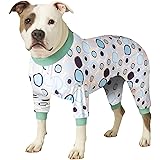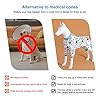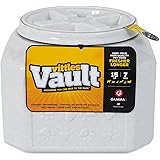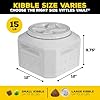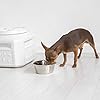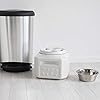Seeing your kitten vomit, have diarrhea, or lose appetite can be tough. These signs often mean your kitten has a sensitive stomach. The right food can help, offering easy digestion and fewer ingredients.
Brands like KOHA and Smalls Human-Grade Cat Food are great. They have high protein and fewer ingredients. This is good for kittens with sensitive stomachs.
Key Takeaways
- Choose kitten food for sensitive stomachs with limited ingredients to reduce the risk of food allergies or intolerances.
- Opt for wet cat food, which is favored for sensitive stomachs due to its higher protein content and lower carbohydrate levels.
- Consider brands like Purina Pro Plan Veterinary Diet or Hill’s Prescription Diet I/D Digestive Care, which contain prebiotics and digestible proteins for gastrointestinal health.
- Feed your kitten small, frequent meals to mitigate vomiting and reduce the risk of regurgitation.
- Consult with your veterinarian to determine the best kitten food for sensitive stomachs and to rule out any underlying health issues.
- Look for sensitive stomach kitten food with novel animal proteins or hydrolyzed protein diets to address severe allergies.
Understanding Sensitive Stomachs in Kittens
Kittens with sensitive stomachs often show signs like vomiting, diarrhea, and not wanting to eat. These signs can upset both the kitten and the owner. Finding the right food is key to helping them feel better.
A kitten food sensitive stomach formula has fewer ingredients to lower allergy risks. It might include pumpkin and cranberries for better digestion and urinary health. Choosing this type of food can help keep your kitten healthy and happy.
These symptoms can come from many things, like food allergies or diseases. Working with a vet to find the cause is important. This way, you can give your kitten the best care and manage their sensitive stomach issues.
| Food Type | Moisture Content | Protein Content |
|---|---|---|
| Wet Food | 70-80% | 40% or higher |
| Dry Food | 10-12% | 30% or higher |
Choosing the right food is crucial for your kitten’s digestive health. Talk to a vet to find the best kitten food for sensitive stomachs for your kitten.
Key Nutritional Requirements for Sensitive Kittens
Feeding kittens with sensitive stomachs requires careful choice. It’s important to pick a gentle kitten food for sensitive stomachs. They need a diet rich in vitamins, minerals, and proteins that are easy to digest. Probiotics and prebiotics also help with their sensitive digestion.
A balanced diet is key for these kittens. Top kitten food for sensitive stomachs should have lots of protein, some fat, and not too many carbs. The Association of American Feed Control Officials (AAFCO) says kittens need at least 30% protein for growth.
Essential Vitamins and Minerals
Vitamins A, D, E, and K are vital for kittens’ health. They must be balanced and in the right amounts for the best health.
Digestible Proteins
Digestible proteins are crucial for kittens. They should come from high-quality sources like chicken, salmon, or lamb. These proteins should be easy to digest and full of essential amino acids.
Probiotics and Prebiotics
Probiotics and prebiotics are key for a healthy gut in kittens. They help good bacteria grow in the gut. This is important for a strong immune system and healthy digestion.
Vet-Recommended Brands for Sensitive Stomachs
Choosing the right food for kittens with sensitive stomachs is crucial. It’s important to look at specialized kitten food for sensitive stomachs. Many vets suggest premium kitten food that’s easy to digest and safe.
Here are some top vet-recommended brands for sensitive stomachs:
- Royal Canin: Known for their high-quality, easily digestible ingredients.
- Hill’s Science Diet: Offers a range of sensitive stomach formulas with prebiotics and antioxidants.
- Purina Pro Plan: Provides a variety of limited-ingredient diets and sensitive stomach formulas.
Brand Overview: Royal Canin
Royal Canin is a favorite among vets for kittens with sensitive stomachs. Their formulas are made to be easy to digest and safe.
Brand Overview: Hill’s Science Diet
Hill’s Science Diet is well-respected for its sensitive stomach formulas. Their foods aim to improve digestive health and prevent stomach issues.
Brand Overview: Purina Pro Plan
Purina Pro Plan is a trusted brand with many options for sensitive stomachs. Their foods are designed to be easy to digest and safe.
Grain-Free vs. Grain-Inclusive: Which is Better?
Choosing the right kitten food is crucial, especially for sensitive stomachs. Grain-free cat food is popular, but it’s important to know the pros and cons. This helps you make a smart choice.
Grain-free foods have more protein, which is good for kittens with sensitive stomachs. Grain-inclusive foods, on the other hand, offer fiber, vitamins, and minerals. Grains also provide protein and fiber.
When picking food for a sensitive kitten, think about their needs. If your kitten has a grain allergy, grain-free might be best. But, if it’s just a sensitive stomach, grain-inclusive could work better. Always talk to your vet to find the right food.
Here are some key points to consider:
- Protein content: Grain-free foods have more protein, which is good for sensitive kittens.
- Fiber content: Grain-inclusive foods have fiber, which is key for health.
- Individual needs: Think about your kitten’s health and needs when choosing between grain-free and grain-inclusive.
By weighing these points and talking to your vet, you can pick the best food for your kitten.
| Kitten Food Type | Benefits | Drawbacks |
|---|---|---|
| Grain-Free | Higher protein content, suitable for kittens with sensitive stomachs | May be more expensive, potential link to dilated cardiomyopathy |
| Grain-Inclusive | Provides fiber, fatty acids, vitamins, and minerals, often lower in calories and fat | May not be suitable for kittens with true grain allergies or intolerances |
Reading Labels: What to Look For
When searching for the best kitten food for sensitive stomachs, reading labels is key. The food should be easy to digest and full of nutrients for growth. Petmd says it’s vital to know the ingredients and nutrients in kitten food.
Look for ingredients like proteins from poultry, red meat, and seafood. These are easy to digest. Avoid foods that can cause allergies or intolerance, like crustaceans, chocolate, and dairy. Also, check the guaranteed analysis to make sure the food is nutritious.
Ingredients to Seek
- Proteins from poultry, red meat, and seafood
- Small amounts of fats
- Essential vitamins and minerals
- Adequate moisture content
Ingredients to Avoid
- Crustaceans
- Chocolate
- Dairy
- Gluten
By knowing what to look for on kitten food labels, you can choose wisely. Always talk to your vet for advice on your kitten’s diet.
Transitioning Your Kitten’s Diet Safely
When you introduce a new food to your kitten, do it slowly to avoid upset stomachs. A quick change can cause stomach issues. So, pick a gentle kitten food for sensitive stomachs. Look for foods with easy-to-digest ingredients and probiotics for a healthy gut.
It usually takes 7-10 days to fully switch foods. Here’s a simple plan:
- Days 1 and 2: ¼ new food, ¾ old food
- Days 3 and 4: ½ new food, ½ old food
- Days 5 and 6: ¾ new food, ¼ old food
- Days 7 to 10: 100% new food
Keep an eye on your kitten’s digestion during this time. If they show signs of upset stomach, like vomiting or diarrhea, go back to the old food. Then, start again more slowly. Choosing a high-quality, gentle kitten food helps your kitten adjust smoothly and stay healthy.
Every kitten is unique, so talk to your vet about the best diet and transition plan. With patience and the right advice, your kitten can thrive on their new food.
| Day | Old Food | New Food |
|---|---|---|
| 1-2 | 75% | 25% |
| 3-4 | 50% | 50% |
| 5-6 | 25% | 75% |
| 7-10 | 0% | 100% |
Homemade vs. Commercial Kitten Food
Choosing between homemade and commercial kitten food is a big decision for pet owners. Homemade diets can be made to fit a kitten’s exact needs, using specialized kitten food for sensitive stomachs for better digestion. But, making homemade food is time-consuming and can be pricey. It also needs careful planning to include all the necessary nutrients.
On the other hand, commercial kitten food is easier and cheaper. Many brands offer premium kitten food for sensitive stomachs that meets specific dietary needs. These foods are made to give kittens the proteins, vitamins, and fats they need.
- Nutritional balance: Commercial foods usually meet basic needs, but homemade diets need careful planning for balance.
- Convenience: Commercial foods are easier and less expensive than making your own.
- Customization: Homemade diets can be adjusted to fit a kitten’s exact needs, using special ingredients.
The choice between homemade and commercial kitten food depends on what’s best for you and your kitten. Think about the pros and cons and talk to a vet. This way, you can choose what’s best for your kitten’s unique needs.
Special Considerations for Allergies and Intolerances
Choosing the right kitten food is key, especially for sensitive stomachs. It’s important to pick food that avoids common allergens. Finding out what your kitten is allergic to can be tough, but it’s crucial for their health.
Identifying Food Allergies in Kittens
Kittens with food allergies might have tummy troubles, skin issues, or both. Look out for vomiting, diarrhea, and itching. If you think your kitten has an allergy, talk to your vet to figure out what’s causing it and find a better food.
Recommended Alternative Ingredients
For kittens with sensitive stomachs, try foods with novel proteins like venison or salmon. Grain-free or limited-ingredient foods can also help. Always start with small amounts to watch for any upset stomach.
Understanding and managing allergies and intolerances is vital. It helps your kitten stay healthy and happy on the right food.
Frequently Asked Questions About Kitten Food
Choosing the right food for your kitten is crucial. It helps them grow and stay healthy. Look for a kitten food that’s made for sensitive stomachs to help with digestion.
Many people wonder how much to feed their kitten. It depends on their age, weight, and how active they are. Kittens need to eat often, with small portions to avoid eating too much.
Another common question is how long to use sensitive stomach food. Kittens should eat this food until they’re about 1 year old. Then, they can switch to adult cat food. Always pick a high-quality food that meets the standards set by the Association of American Feed Control Officials.
Here are some important tips for feeding your kitten:
* Make sure their diet is balanced and complete.
* Don’t overfeed to prevent obesity and health issues.
* Choose a food that’s easy on their stomach to avoid digestive problems.
* Switch to adult cat food at the right time for a smooth transition.
How to Monitor Your Kitten’s Digestive Health
It’s important to watch your kitten’s digestive health, especially if they have a sensitive stomach. Knowing the signs of good digestion and keeping a food diary can help spot problems early. A gentle kitten food for sensitive stomachs can greatly improve your kitten’s health.
Signs of a sensitive stomach in cats include vomiting, diarrhea, loss of appetite, and weight loss. If you see these signs, talk to your vet right away. They might suggest a top kitten food for sensitive stomachs that’s easy to digest and full of nutrients.
Recognizing Healthy Digestion
A healthy kitten should eat well, have regular bowel movements, and have a shiny coat. If your kitten’s behavior or physical condition changes, it’s important to look into it. Keeping a food diary can help you track what your kitten eats and spot any allergens or irritants.
Keeping a Food Diary
A food diary is a great way to keep an eye on your kitten’s digestive health. By recording what your kitten eats, their bowel movements, and any symptoms, you can find patterns and problems. This info can help your vet make better decisions for your kitten’s care.
Every kitten is unique, and what works for one might not work for another. By working with your vet and watching your kitten’s digestive health, you can help them live a happy and healthy life. With the right gentle kitten food for sensitive stomachs and care, your kitten can do well.
The Role of Water in Digestive Health
Water is key for kittens’ digestive health. It helps prevent constipation and lowers the chance of stomach problems. Kittens eating specialized kitten food for sensitive stomachs need to drink more water.
A hydrated kitten can digest food better, like premium kitten food for sensitive stomachs. This lowers the risk of stomach issues. To get them to drink more, offer many water sources, use water fountains, or mix a bit of water into their food.
Watching your kitten’s water intake is important for their health. Talk to your vet for tips on keeping your kitten’s digestive system in top shape.
| Signs of Dehydration | Signs of Proper Hydration |
|---|---|
| Dry mouth | Moist gums |
| Dark urine | Pale yellow urine |
| Lethargy | Energy and playfulness |
Signs That Your Kitten’s Food Isn’t Working
As a responsible pet owner, it’s key to watch your kitten’s health and change their diet if needed. If your kitten is eating kitten food for tender stomachs but still has digestive problems, it might be a sign that the food isn’t right. Cats often vomit once or twice a week, showing they have a sensitive stomach. But, if they vomit or have diarrhea for more than 24 hours, you need to see a vet.
Some signs that your kitten’s food isn’t working include behavioral changes like being tired, not wanting to eat, or being more anxious. Physical signs can be diarrhea, vomiting, or itchy skin. If you see any of these, you should talk to your vet to figure out what to do next.
When picking a new food, think about a sensitive stomach kitten food that fits your kitten’s needs. Choose foods with good ingredients, like hydrolyzed proteins, and avoid common allergens like chicken, beef, or dairy. By working with your vet and watching your kitten’s health, you can find the right food for their sensitive stomach and help them live a happy, healthy life.
- Digestibility: Look for foods with high-quality ingredients and minimal processing.
- Ingredient quality: Avoid vague terms like “meat and animal derivatives” or “meat meal.”
- Composition: Ensure the food meets your kitten’s nutritional needs, with over 50% animal protein, up to 20% fat, and maximum 3% carbohydrates/fiber.
By spending time to find the best kitten food, you can avoid digestive problems and ensure your kitten lives a long, healthy life.
Consulting Your Vet: When to Seek Help
When looking for the best kitten food for sensitive stomachs, talking to your vet is key. They can find out why your kitten’s stomach is upset and suggest the right food. If your kitten is vomiting, has diarrhea, or won’t eat, you should see a vet.
Your vet will check your kitten’s health and tell you what to do next. They might suggest a simple diet or a special kitten food. Brands like Hill’s Science Diet and Royal Canin have formulas for kittens with sensitive stomachs.
Working with your vet to watch your kitten’s diet is also important. This way, you can make sure your kitten gets the best food for their needs. Remember, every kitten is different. With the right help, you can find the perfect food for your kitten’s sensitive stomach.
| Brand | Formula | Key Ingredients |
|---|---|---|
| Hill’s Science Diet | Sensitive Stomach | Chicken, Rice, and Omega-3 Fatty Acids |
| Royal Canin | Gastro Intestinal | Chicken, Wheat, and Prebiotics |
Conclusion: Finding the Best Food for Your Kitten
Finding the right food is crucial for a kitten with a sensitive stomach. We’ve seen that vet-recommended brands like Royal Canin, Hill’s Science Diet, and Purina Pro Plan are great options. They offer gentle, easy-to-digest nutrition for kittens with sensitive stomachs.
Recap of Key Takeaways
This article has stressed the need to understand sensitive stomachs in kittens. We’ve talked about the nutrients they need and how to choose the best kitten food for sensitive stomachs. It’s important to check the food’s quality and watch how your kitten reacts.
Final Recommendations for Sensitive Stomachs
When looking for the perfect food for your kitten, start with small changes. Watch how they react and talk to your vet if you’re unsure. The right gentle kitten food can help your kitten live a happy, healthy life.


